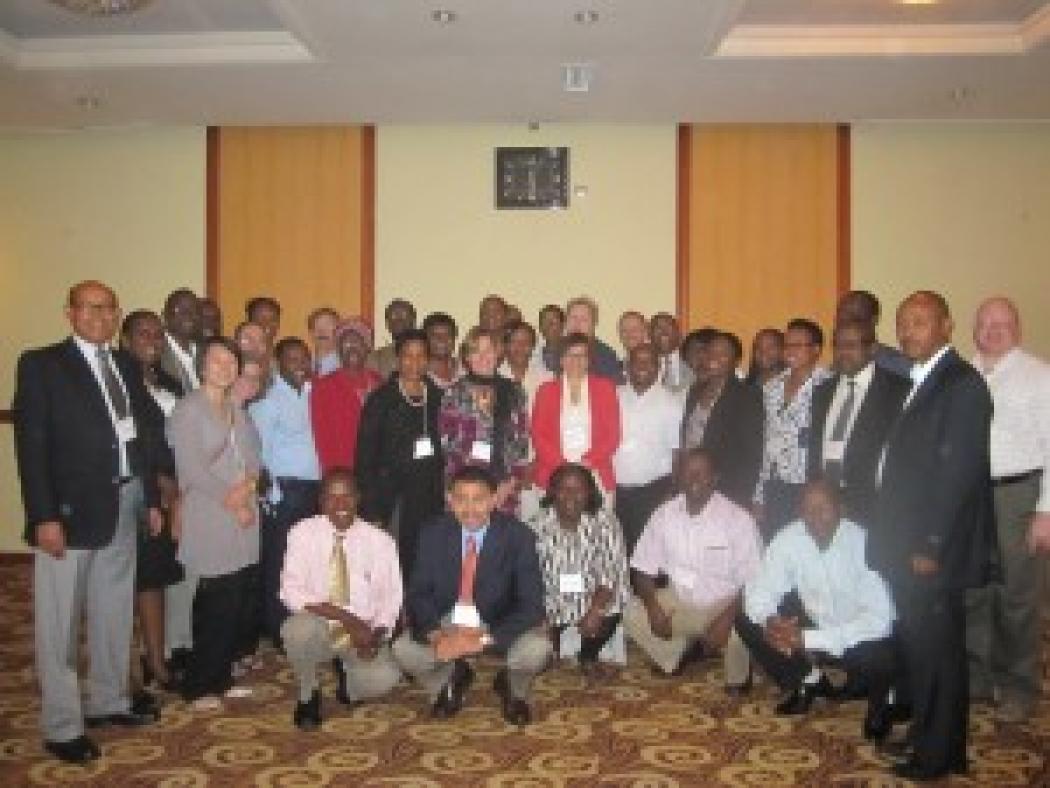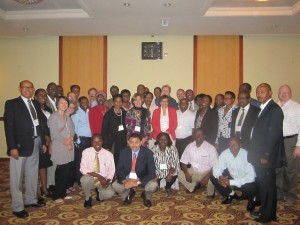Moving Toward a Better Vision of What Community Health Worker Programs Can Be

By Lauren Crigler and Donna Bjerregaard, Initiatives Inc.
Community health workers (CHWs) are the ultimate frontline health workers in many health systems around the globe, playing a vital role in extending services to the most underserved populations. Last month, 60 decision-makers, program implementers, and partners representing six African countries gathered in Addis Ababa, Ethiopia to find common ground on tools and approaches that can realize the full potential of CHW programs, which have grown in size and scope across the world. The positive effects of CHW programs in contributing to better maternal and child health outcomes have been documented, but so too have the multiple challenges of managing CHW programs and ensuring quality services.
The meeting, sponsored by USAID through its Health Care Improvement Project, and with support of the Federal Ministry of Health of Ethiopia and UNICEF, focused on three major issues facing CHW programs: functionality (quality performance and effectiveness), sustainability (capacity of countries to continue programs that currently rely on donor funding and implementation assistance), and scalability (how to scale up programs to cover more communities or service needs).
Six countries were represented: Ethiopia, Uganda, Rwanda, Kenya, Zambia and Mali. The Ministry of Health of each country presented on their CHW program, including both NGO/partner-supported and government- supported efforts. The presentations demonstrated that with strong government support, a variety of large-scale CHW mechanisms are possible across different countries—from the salaried Health Extension Workers of Ethiopia to the 45,000-strong cadre of volunteer community health workers in Rwanda.
Part of the meeting focused on how implementers have used a tool developed with USAID support to guide implementers in identifying weak areas in CHW programs and identifying specific actions to improve program functionality. The CHW Assessment and Improvement Matrix (CHW AIM) tool facilitates participatory self-assessment about program strengths and weaknesses and action planning. Many participants commented that CHW AIM helped them create a platform for identifying what their critical CHW program issues were, while others were using its criteria for functionality to strengthen specific program components, like supervision.
While the meeting did not generate grand statements, there was a strong feeling among those of us gathered that we now have a broad consensus about how to make CHW programs function well. There is solid agreement that CHWs, whether paid or volunteer, need certain kinds of support and that communities do need to be involved in selecting, supporting, and supervising CHWs. In her keynote address, Dr. Miriam Were of Kenya recognized that many different options for such support are possible, including team-based support, peer-to-peer support, and community involvement.
There is also more acceptance now that CHWs need opportunities for growth and advancement. For example, professional advancement—five years ago, people weren’t sure this was an appropriate issue for CHWs. Now, we think few would question its relevance to sustaining the engagement of community level health agents.
Two key needs emerged from country decision-makers: They want evidence to help guide decision-making about how to operate CHW programs at national scale, and, once programs are functional, how do you sustain that? Participants brainstormed about scalability and sustainability to identify key questions that needed to be addressed before a program should move to scale up and questions to guide the design of sustainable programs. Questions generated in small group discussions were discussed in plenary, consolidated and re-presented to the participants on the final day of the conference in the form of checklist for assessing readiness for scalability of CHW programs. These questions will continue to be discussed on www.chwcentral.org, an online community that supports CHW program implementers.
Ideas from the meeting are now informing the development of a CHW program decision-making tool—a new tool to help decision-makers grapple with the tough questions about how to design (e.g., pay or not pay) and discuss the implications of each.
Overall feedback from the participants was very positive; each country left with an action plan to help them introduce new ideas in their CHW programs. As one participant said, “It was wonderful to have so many stakeholders from our corner of the world sharing relevant ideas, experiences, and feedback. I feel like we're really moving toward a better vision of what our programs can be, what they can achieve, and how. I'm looking forward to seeing how this meeting will impact all of the countries who were represented. I know I wasn't the only one who left feeling re-inspired.”
Lauren Crigler and Donna Bjerregaard are Senior Technical Advisors with Initiatives Inc., a women-owned small business is aimed at strengthening health systems, improving quality health care, and reinforcing NGO and community organizations. Initiatives is a partner with URC on the USAID Health Care Improvement Project.

